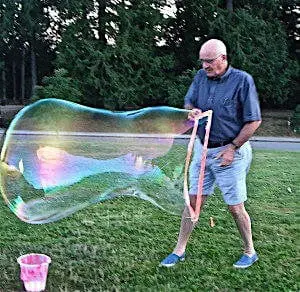In today’s intense world where alternative facts masquerade as truthful statements; Executive Orders bring confusion and fear; outrage is commonplace; inner peace is quickly disappearing; concerns and fears about compromised health, terrorism, disasters, broken relationships, economic crises, political harangue and other stressors bring confusion, frustration, anger, and fear, a Spirituality of Play may seem to be a curious matter.
But, more than ever, a Spirituality of Play is an attitude that needs to be cultivated in society, in educational systems, in families, by seniors and adults and by children and youth so they can become adults who live balanced lives where laughter, joy and hope are intrinsic throughout their adult life.
From the Greek word selig (which means blessed) comes the English word silly. I like to think that there is something sacred about the ability, to be silly, to play, to laugh, to be child-like. Many faith traditions (Christian and Hasidic storytellers, Zen masters, Taoist sages) encourage us not to take ourselves too seriously. These prophets have an important role in the spiritual life because they espouse the spiritual practice of play as Ralph Waldo Emerson wrote “It is a happy talent to know how to play” and as author Margaret Guenther wrote “When we play, we also celebrate holy uselessness. Play, in its disinterestedness and self-forgetting, can be fruitful.”
When we play; when we enjoy the fullness of life with its curiosities, frivolities and insensibilities; when we don’t take ourselves too seriously, play (like prayer), can be healing – healing to the body, mind and soul.
~ When Hindus speak of the creation of the universe, they don’t call it the ‘work’ of God; they call it the ‘play’ of God which can translate into ‘play’ being sacred and holy. When we play, we leave behind the daily stressors and allow our spirit to breathe and re-create ~ Literature, the arts, various traditions and holidays remind us of the importance of play of giving ourselves permission to be silly and foolish ~ Russian artists from the 15th century often featured the yurodivy, a kind of “holy fool” in their paintings ~ April Fool’s Day is a day for laughing, for playing gentle jokes and for trying to trick friends. ~ On the last day of the nature festival ‘The Hill’ in India, people have fun by sending friends on impossible errands such as finding a stick with only one end. ~ In Native American traditions, Coyote is the Trickster while in the Aztec tradition, Coyote is referred to as ‘God’s Dog’, and in Hollywood, Wil E. Coyote always played tricks on the Roadrunner.
A Spirituality of Play helps us live with mystery, paradox and absurdity. It can open doors of flexibility, intuition, vulnerability, and doors of child-like innocence and spontaneity. If we can believe that the Creator created anteaters, duck-billed platypuses, giraffes clownfish, pink flamingoes,
and us (!), surely it’s not surprising that the Creator has a great sense of humour and encourages us to laugh – and play!
Age creeps up … surprises us … reminds us of our mortality. Chronological aging is one thing. Growing old is another thing. Perhaps many grow old because they stop playing? Play comes in many forms: laughter, dancing, doodling, board games, running with the dog along the beach, playing bridge, engaging in a sport, playing an instrument, creating anything (a shed, a dress, a poem, a painting, a piece of calligraphy, a meal, a book, a piece of pottery, a magazine article, a computer program, a piece of sculpture, a photograph, a monogram, a garden, a scrapbook, a bookcase) …
I may be aging more quickly than I would like, and my body may be showing its age a bit more every day, but I refuse to grow old. Even if it’s only a bit each day, (just as I try to exercise a little each day), I try to play a little each day. This week I’ll be playing with cardstock and paper and creating a handmade card for a friend who is unwell; when it’s cooler outside, I’ll be playing in the garden; and then there’s the recipe book I borrowed from the library that is inviting me to play in the kitchen and try out some new recipes. I suppose I could look at these three ‘play’ activities and see them as ‘chores,’ but I don’t.
Perhaps attitude plays an important role in the aging process. My beloved husband Hans was 85 (!) years young when I took this photo of him playing with bubbles in a local park. Hans was a pen and ink artist, calligrapher, retired engineer – a serious intellect – who grew to understand in his later years, the importance of incorporating a Spirituality of Play in his life. Each day, I ‘age’ – but I don’t ever want to ‘grow old.’ If I reach Hans’ age, I want to still be incorporating a Spirituality of Play every day, in some way.

© Photo & Text: June Maffin
www.facebook.com/groups/soulistry
Discover more from Soulistry.com
Subscribe to get the latest posts sent to your email.
